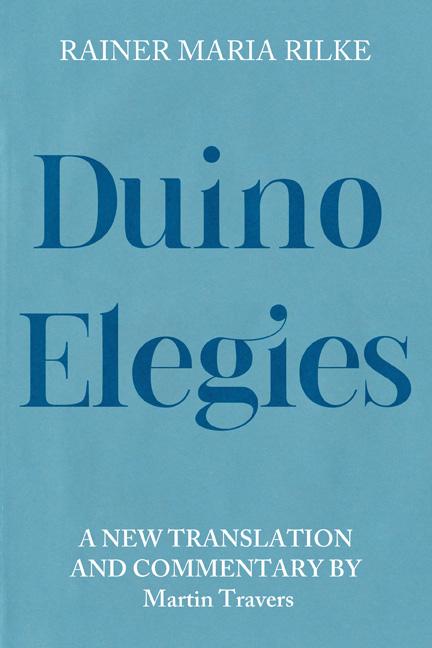Elegy 4
Published online by Cambridge University Press: 10 January 2024
Summary
In the fourth Elegy, we are pressing the heart to reveal the past (but it is possible that it will not). Elegy 4 (“the most bitter and negative of all the Elegies,” Leishman and Spender, 116) moves into the elegiac mode proper, both formally and thematically. Written in a blank verse of largely iambic pentameter lines, it gives voice to a mosaically formed retrospective that is both self-conscious and, at times, possibly ironically plaintive. The tree ontology from the second Elegy receives revitalization that, alas, will be no more than temporary: it must, like us, give way to winter, where the inner self has become a victim of cold self-consciousness. Even for lovers, summer has gone, for in “loving” we evade not only the other but ourselves. Integrity can be found only with, and within, the puppet. It is an artificially and hence artfully fabricated creature, but precisely because of this, it transcends the disjointed and disunited human. It comes together with the Angel, producing a spectacle in which all is transformed. The father figure appears, now alive, now dead, and sometimes occupying a shadowy realm between the two, and this leads to an extended meditation upon childhood, and the death of a child, in grim lines that hover between the acceptably metaphorical and the disconcertingly literal.
The Elegy begins with words that are angular in their syntax and fatalistic in their tone.
O Bäume Lebens, o wann winterlich?
Wir sind nicht einig. Sind nicht wie die Zugvögel
verständigt. Überholt und spät,
so drängen wir uns plötzlich Winden auf
und fallen ein auf teilnahmslosen Teich.
Blühn und verdorrn ist uns zugleich bewußt.
Und irgendwo gehn Löwen noch und wissen,
solang sie herrlich sind, von keiner Ohnmacht.
Uns aber, wo wir Eines meinen, ganz,
ist schon des andern Aufwand fühlbar. Feindschaft
ist uns das Nächste. Treten Liebende
nicht immerfort an Ränder, eins im andern,
die sich versprachen Weite, Jagd und Heimat.
Da wird für eines Augenblickes Zeichnung
ein Grund von Gegenteil bereitet, mühsam,
daß wir sie sähen; denn man ist sehr deutlich
mit uns. Wir kennen den Kontur
des Fühlens nicht: nur, was ihn formt von außen.
- Type
- Chapter
- Information
- Duino ElegiesA New Translation and Commentary, pp. 123 - 150Publisher: Boydell & BrewerPrint publication year: 2023

